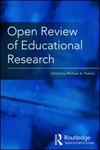爱、关注和教育:陀思妥耶夫斯基的《卡拉马佐夫兄弟》
Q1 Arts and Humanities
引用次数: 9
摘要
摘要陀思妥耶夫斯基的最后一部小说《卡拉马佐夫兄弟》是十九世纪最具影响力的作品之一。然而,到目前为止,这本书对教育家的潜在价值在很大程度上被忽视了。本文论述了《卡拉马佐夫兄弟》中一个重要的教学主题,即“爱是老师”的概念。正如陀思妥耶夫斯基所理解的那样,爱是积极而困难的;它关注的不是爱人类的抽象概念,而是日常生活中混乱的细节。有人会说,主动的爱与Iris Murdoch的注意力概念有很多共同之处。文章的第一部分考察了《卡拉马佐夫兄弟》中的几个段落,这些段落涉及积极的爱的主题。第二部分结合默多克的思想从文本中分析了这些例子,并探讨了它们更广泛的教育意义。本文章由计算机程序翻译,如有差异,请以英文原文为准。
Love, attention and teaching: Dostoevsky's The Brothers Karamazov
ABSTRACT Fyodor Dostoevsky's final novel, The Brothers Karamazov, is one of the most influential works of the nineteenth century. To date, however, the potential value of the book for educationists has been largely ignored. This article addresses a key pedagogical theme in The Brothers Karamazov, namely, the notion that ‘love is a teacher’. Love as Dostoevsky understands it is active and difficult; it focuses not on the abstract idea of loving humankind but on the messy particulars of everyday life. Active love, it will be argued, has much in common with Iris Murdoch's concept of attention. The first part of the article examines several passages in The Brothers Karamazov that address the theme of active love. The second section analyses these examples from the text in the light of Murdoch's ideas and explores some of their broader educational implications.
求助全文
通过发布文献求助,成功后即可免费获取论文全文。
去求助
来源期刊

Open Review of Educational Research
EDUCATION & EDUCATIONAL RESEARCH-
CiteScore
2.60
自引率
0.00%
发文量
0
审稿时长
22 weeks
 求助内容:
求助内容: 应助结果提醒方式:
应助结果提醒方式:


